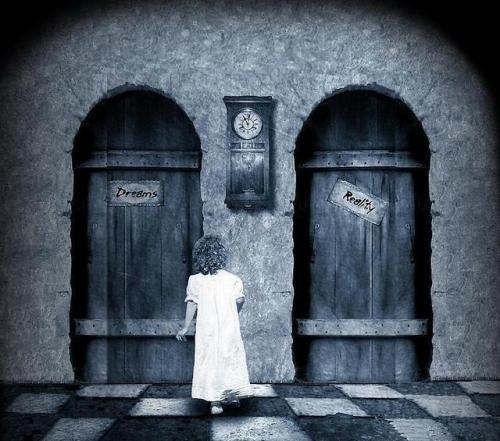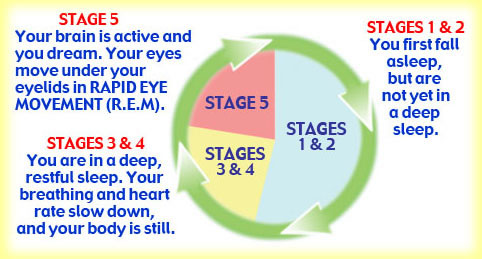 Failing a test
Failing a testThis dream usually manifests itself in people who have been out of school for a long time. In the dream you are prevented from passing a test in a variety of different possible scenarios. In one scenario you find that you are unable to make it to the test on time, often through being unable to find the test room. In other versions you are unprepared (either through lack of study) or you are missing equipment. This dream usually means that you are feeling tested in some way in your real life. You may feel that you are unprepared for something or playing the wrong part in life.
Being Chased

Dreaming of being chased can be a truly horrifying experience. Most often the chaser is a monster or some person that is frightening, and occasionally it may be an animal. You may be surprised to know that this isthe most commonly experienced nightmare theme. The meaning of these dreams is that someone, something (possibly something as obscure as an emotion) is making you feel threatened. One way to determine the root of the threat is to ask yourself who or what in yourreal life most closely resembles the “creature” or circumstance in your dream. It is also worth noting that sometimes this dream is a replay of an actual event in your life.
Teeth dreams
Dreams about your teeth reflect your anxiety about your appearance and how others perceive you. Sadly, we live in a world where good looks are valued highly and your teeth play an important role in conveying that image. These dreams may stem from a fear of your sexual impotence or the consequences of getting old. Teeth are an important feature of our attractiveness and presentation to others. Everybody worries about how they appear to others. Caring about our appearance is natural and healthy. Another rationalization for these falling teeth dream may be rooted in your fear of being embarrassed or making a fool of yourself in some specific situation. These dreams are an over-exaggeration of your worries and anxiety.�
Teeth are used to bite, tear, chew and gnaw. In this regard, teeth represent power. And the loss of teeth in your dream may be from a sense of powerlessness. Are you lacking power in some current situation? Perhaps you are having difficulties expressing yourself or getting your point across. You feel frustrated when your voice is not being heard. You may be experiencing feelings of inferiority and a lack of self-confidence in some situation or relationship in your life. This dream is an indication that you need to be more assertive and believe in the value of your own opinion.
In the latest research, it has been shown that women in menopause have frequent dreams about teeth. This may be related to getting older and/or feeling unattractive and less feminine.
Naked dreams
In this type of dream you are in a state of undress, partial undress, or inappropriate dress (for example wearing pajamas to work). Occasionally you are the witness of another person who is naked while you are clothed. This is often accompanied by feelings of embarrassment and shame, but occasionally with the feeling of pride or freedom. The meaning of this dream is thatyou are feeling exposed, awkward, or vulnerable, or you are afraid that you have revealed too much of yourself (such as a secret or a very personal feeling) in a real life situation. An interesting fact about this type of dream is that it occurs much more frequently in people who are involved in a wedding ceremony in theirreal life.
Falling dreams
Flying dreams fall under a category of dreams known as lucid dreaming. Lucid dreams occur when you become aware that you are dreaming. Many dreamers describe the ability to fly in their dreams as an exhilarating, joyful, and liberating experience.
If you are flying with ease and enjoying the scene and landscape below, then it suggests that you are on top of a situation. You have risen above something. It may also mean that you have gained a different perspective on things. Flying dreams and the ability to control your flight is representative of your own personal sense of power.
Having difficulties staying in flight indicates a lack of power in controlling your own circumstances. You may be struggling to stay aloft and stay on course. Things like power lines, trees, or mountains may further obstruct your flight. These barriers represent a particular obstacle or person who is standing in your way in your waking life. You need to identify who or what is hindering you from moving forward. It may also be an indication of a lack of confidence. You need to believe in yourself and not be afraid.
If you are feeling fear when you are flying or that you feel that you are flying too high, then it suggests that you are afraid of challenges and of success. In reality, we cannot really fly, of course. Thus, such dreams may represent that which is beyond your physical limitations. In your mind, you can be anybody and do anything. Another way of interpreting flying dreams is that these dreams symbolize your strong mind and will. You feel undefeatable and nobody can tell you what you cannot do and accomplish. Undoubtedly these dreams leave you a great sense of freedom.
Faulty machinery
In the faulty machinery dream you are trying to operate mechanical equipment which either fails to work, or fails to work in the way that you expect it to. The vast majority of these dreams involve a telephone – either trouble dialing, losing a connection, or dialing a wrong number. It can involve a lost Internet connection, or something manual like a jammed or broken machine. This dream often means that you feel you are losing touch with reality, or that a part of your body or mind is not functioning as it should. It can also occur when you are feeling anxious about making a connection with another person in real life.
Lost or trapped
Dreaming about being lost is very common and will usually occur when you are having conflict in deciding how to react in a situation in real life. In the dream you are trying to find your way out of an area – such as a forest, city streets, a large building, or other maze-like structure. Another way this dream plays out involves you being trapped, buried alive, caught in a web, or unable to move for some other reason. This is often accompanied by a feeling of terror. This dream usually means thatyou are trapped in real life – unable to make the right choice.
Ill or dying
In this dream, you (or a loved one) are ill, injured, or dying. It is a moderately common dream and, not surprisingly, occurs often at the onset of an illness. Aside from becoming ill, this dream can mean thatyou are emotionally hurt or are afraid of becoming hurt. The dream may also be warning you of an upcoming physical risk to yourself or a loved one. When it is someone else in the dream that dies, it can mean that you feel that part of yourself (that you see represented by that person) is dead. It may also mean that you wish the person would go away, or that you fear losing them.
References:
http://www.dreammoods.com/commondreams/
http://listverse.com/2008/10/07/top-10-common-dreams-and-their-meanings/
http://www.analysedreams.co.uk/CommonDreamsCategory.html







































